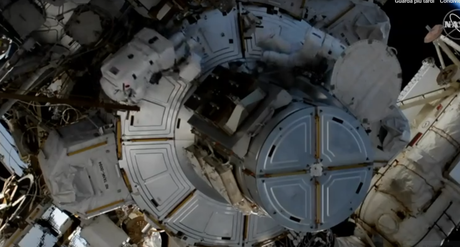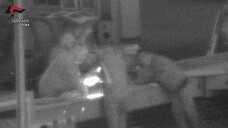A new all-female spacewalk has ended: the protagonists were astronauts Christina Koch and Jessica Meir, both from NASA, and performed over seven hours of work outside the International Space Station to replace some solar panels' batteries. Mission accomplished, despite an unexpected event when AstroChristina lost the camera of her helmet.
"The loss of the the helmet camera means having less visibility," said Claudio Sollazzo, human flight and space station expert, with long experience in the European Space Agency (RSA) and the Italian Space Agency (ASI). "The cameras - he continued - allows the control center on Earth to have a clear view of the area in which the astronauts are at work. If the astronauts no longer have a camera, they are forced to describe in a much clearer and more detailed way what they are doing ".

Astronauts Christina Koch and Jessica Meir exit from the Space Station hatch (source: NASA TV)
It is not the first time that an object is lost during a spacewalk: it happened with drills, scissors and several other work tools, which end up in an orbit from which they do not pose a risk to the Space Station. But in this case it was a component of a spacesuit that got lost, despite "the hundreds of checks that are continuously carried out on the suits, even in the days preceding the spacewalk. The camera on Christina Koch's helmet- said Sollazzo – had been certainly checked too, but the suits have been used for years and it is possible that the coupling mechanism may have come loose due to wear".
AstroChristina was the leader of this Extra-Vehicular Activity (EVA), but even without her camera it was possible to complete the long sequence of operations, which took just over seven hours and in which three old batteries were removed, placed on a temporary housing hooked to the robotic arm of the orbital station, the Canadarm, and were replaced with new lithium batteries, more charge-efficient and technologically advanced. To complete the operation AstroChristina and AstroJessica will have to perform another EVA, scheduled on January 20.
Riproduzione riservata © Copyright ANSA













